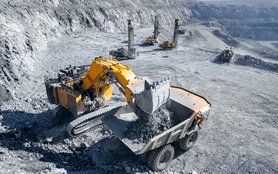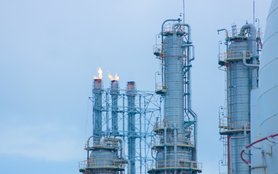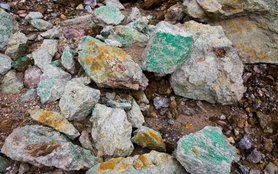Guardrails for respecting Indigenous peoples’ rights will be vital to ensuring a just energy transition given growing fervor around mining. These must include increased protections for human rights defenders and respecting the right of Indigenous peoples to say “no” to mining on their ancestral lands and territories.
It’s no secret that the Trump administration has made the development of “critical” minerals a major priority for the US -- issuing several Executive Orders and chasing high profile mineral deals in places like Ukraine and Greenland. While receiving plenty of coverage, the US is far from the only government increasing its focus on mining.
In Central America, in late 2024 El Salvador’s Congress overturned a law which had banned all forms of metallic mining. In Honduras, despite a 2022 open-pit mining moratorium, recently the government developed a proposal for a new national mining policy and a new bill that could expedite environmental licenses and limit citizen participation in decisions around extractive projects. For a region that struggles with water scarcity exacerbated by climate change and social conflicts related to mining, these decisions to expand mineral development are deeply contentious. Future decisions should be considered carefully.
In Guatemala, the government’s pending decision around development of the Escobal silver mine will be an important test case for whether this zeal for minerals will override Indigenous peoples’ rights to make development decisions about their lands and resources. The Xinka Indigenous people are at particular risk of project impacts to their ancestral lands, their livelihoods, and their cultural heritage. The Xinka Parliament has been working to ensure that the Xinka people have a real say in mining decisions in line with their right to self-determination and to Free, Prior, and Informed Consent under international law. After a lengthy and participatory community consultation process, and considering worrying findings from environmental and health studies in the area, this month the Xinka peoples shared their decision: they do not consent to the mining project.
The Guatemalan government might have long ago predicted this outcome. The Xinka people have protested the mine for two decades and at least 14 people have been killed and 200 criminalized as a result of their activism in defense of their land. In 2018, the Constitutional Court halted the project and ordered the government to consult with Indigenous communities. This decision triggered the extensive consultation that just concluded.
Unfortunately, this decision comes amid rising criminalization of Indigenous leaders and wider threats to democracy across the country. In April, two Indigenous leaders who participated in peaceful pro-democracy protests in 2023, Luis Haroldo Pacheco Gutiérrez, former president of the Indigenous organization Concejo de Alcaldes de los 48 Cantones (Council of Mayors for the 48 Cantons) and current Deputy Minister of Energy and Mines, and Héctor Manuel Chaclán Batz, former treasurer for the same Indigenous organization, were arrested on trumped-up charges of terrorism and obstruction of justice, among others. Guatemala’s President described Pacheco’s arrest as “an attack on democracy” and the Inter-American Commission on Human Rights condemned Guatemala’s Public Prosecutor for “the arbitrary criminalization of Indigenous authorities who peacefully led large-scale demonstrations in 2023 to defend the popular will expressed during the presidential elections.”
The European Union (EU) also issued a statement expressing concern over these two arrests, as well as “the instrumentalisation of the justice system and the misuse of legal and procedural measures targeting elected officials, human rights defenders, journalists, indigenous leaders and judicial operators.” The EU called on Guatemala’s Public Prosecutors office to uphold the rule of law.
Meanwhile, the Attorney General bringing these cases forward faces corruption allegations which have resulted in sanctions being brought by several foreign governments, including the US. Guatemalan President Arevalo has unsuccessfully called for her resignation.
This broader context significantly heightens risks for the dedicated Xinka Parliament leaders who have engaged their communities in discussions related to the environmental, health, cultural, and human rights impacts of the Escobal mine throughout a lengthy consultation process. To promote the protection of these leaders, the US government should:
- Condemn the arrests on Pacheco and Chaclán and urge the Prosecutor’s Office to cease efforts to persecute those who participated in peaceful pro-democracy protests in 2023.
- Urge the Inter-American Commission on Human Rights to extend precautionary measures to additional Xinka Parliament leaders.
- Support the Xinka Parliament’s decision to oppose mining on their ancestral lands and territories.
Minerals will be important to the global energy transition, but there will be some instances when projects should not move forward, including when Indigenous peoples withhold their consent for mining on their lands. Central America is not a particular hotspot for energy transition minerals, and the Escobal mine produces silver (not considered a “critical” mineral). Governments will be much better off, and potentially avoid years of social conflict and litigation, if they consult communities prior to licensing mining concessions and only proceed with then have their Free, Prior, and Informed Consent.



